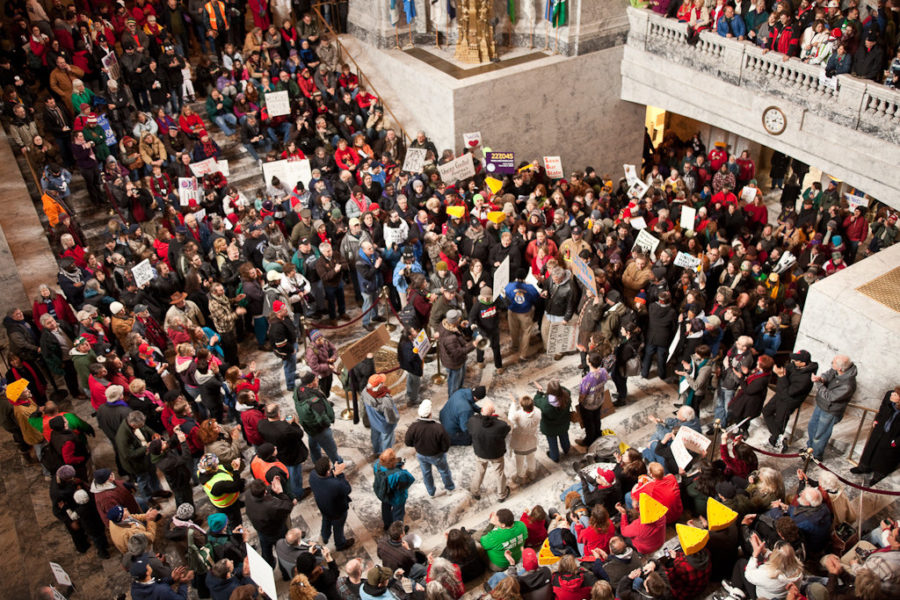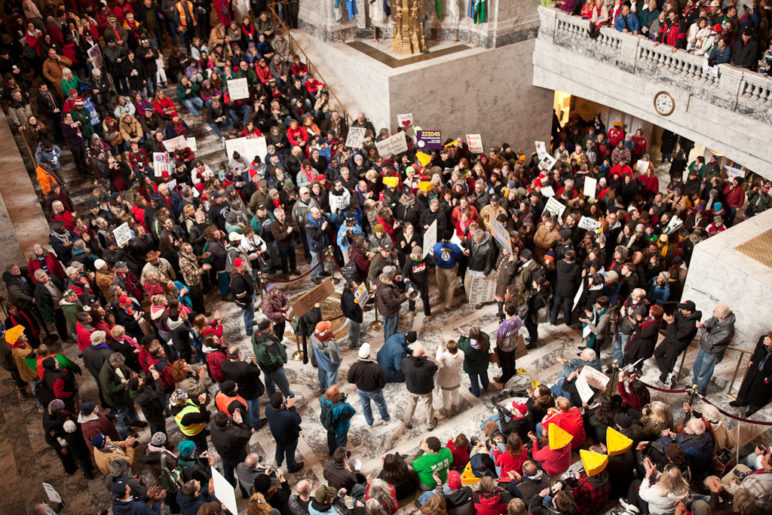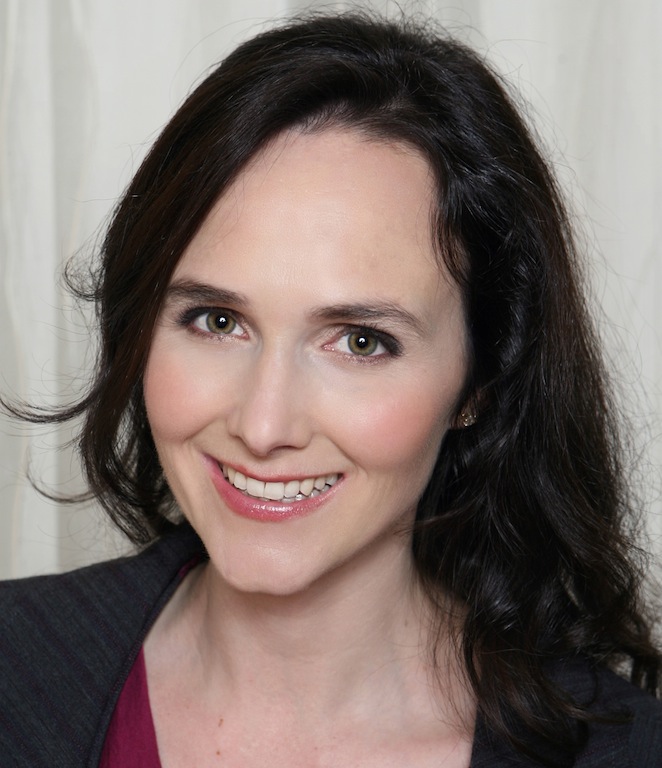In our last two articles in this series, we described the Washington Government Accountability Act’s tough new rules for reducing lobbyists and contractors’ influence in Olympia and for boosting transparency in elections, so that voters have easy access to the information they need about their candidates. In this article, we detail another voter-empowering component of I-1464: Democracy Credits.
What are Democracy Credits?
Democracy Credits are a powerful tool to dilute the influence of #BigMoney in WA elections. #waelex
Democracy Credits are a powerful tool to dilute the influence of Big Money in Washington State elections and restore balance to state democracy. In short, they equip each registered voter in the state with $150 worth of donations to contribute to the candidates of their choice. This helps level the playing field between everyday citizens and the savvy, well-funded special interests that currently account for the majority of political donations and skew policymakers priorities to their own.
Democracy Credits mean candidates will not have to “dial for dollars” with only wealthy donors or special interest organizations; instead, they’ll get to spend more time talking with ordinary Washingtonians and learning their concerns. It also means a broader range of individuals will be able to run for office, even if they don’t have a rolodex of wealthy friends and family. This time, we’ll discuss how they work from a voter’s perspective, and next time, we’ll do the same from a candidate’s view.
How can I get my own Democracy Credits?
Democracy Credits are simplicity itself for voters. If you are registered to vote in Washington, you’ll receive an envelope from the Public Disclosure Commission (PDC) in the mail in late March of each state election year. Inside will be instructions, along with a unique identifying number, for each of your three $50 Democracy Credits.
The instructions will explain that the people of Washington have set aside by initiative a small pool of public money to distribute to candidates who agree to obey the Washington Government Accountability Act’s tough new rules: no big money, no secret money, tight limits on total public money the campaign may receive, and no shady coordination with PACs or other so-called independent expenditure campaigns. To distribute this money to candidates, the instructions will explain, Washington is leaving everything up to voters like you.
How can I use them to support my candidates?
You can give your Democracy Credits to any candidate for state representative or state senator who has consented to comply with the rules above. (In 2024, the program may expand to include candidates for governor, secretary of state, attorney general, commissioner of public lands, and justice of the state supreme court.) You may give all three Credits to one candidate, one credit each to three candidates, or two to one candidate and one to another.
The whole Democracy Credit system is public and transparent: it’s like a card game where everyone’s cards are face up—not terribly suspenseful but almost impossible to cheat in.
To contribute a Democracy Credit, you will provide electronic authorization approved by the PDC: probably your name, address, date of birth, social security number or Washington driver’s license or identicard number, signature, and the Credit’s unique number. If you wish to use paper vouchers instead, you may request them from the PDC (Section 12(4)).
If you’re among the few Washington voters who pay very close attention to state politics, you might sit right down and go to your favorite candidate’s website to send over your Credits. If you’re a more typical voter, though, you might think, “Oh, cool. I wonder who’s running.” Then you will set the Credits aside and forget about them until…
A few months later, you might get an invitation to a house party from a friend. “Come over and meet my favorite candidate for the Washington State Senate, and bring your Credits!”
Or a candidate might knock on your door, telling you her positions and asking for your vote and your Credits.
Or you might get an email from a group you belong to—a union, an association of small business owners, the Sierra Club, the Tea Party, OneAmerica Votes, whatever—saying, “We endorse Rey for Governor. Let’s all send Candidate Rey our Credits this week!”
Or your coworkers or church group or yoga buddies might be talking politics, and you’ll learn something that convinces you to send a Credit to Candidate Lee instead.
Or you might hear a radio interview with Candidate Rodriguez that gets you fired up to send your Credits his way.
Or you might find yourself talking with a candidate at the farmer’s market and want to assign your Credits on the spot. The candidate will probably have a volunteer standing by with a tablet to help you click through the Washington Democracy Credit site and assign your credits.
What about fraud and cheating?
If someone offers to buy your Credits, you can report them to the police or PDC. Trying to buy or sell Credits is a serious crime, like buying votes—the penalties include prison time. A candidate whose campaign participates in such fraud can be ejected from the program and required to repay public funds.
If you suspect another candidate’s campaign is cheating, you can call the police or PDC, or you can send a tip to a political reporter or a campaign you suspect is being put at a disadvantage. You can even investigate the matter yourself by looking up their Credits online. The whole Democracy Credit system is public and transparent: it’s like a card game where everyone’s cards are face up—not terribly suspenseful but almost impossible to cheat in.
And if I forget about my Credits?
Again, most voters will receive their Democracy Credit information in March and set it aside for months, until the election nears. If a voter loses that information, including the PIN to use the Credits, she can simply contact the PDC to replace it. Or, if she forgets whether she’s already used the Credits or wants to check on their status after submitting them, she can easily verify the information on the PDC website.
Democracy Credits empower everyday Washington voters
Americans agree across party lines that the influence of Big Money in politics weakens our democracy and throws it out of balance. Democracy Credits help restore that balance by giving everyone a more equal voice in supporting the candidates of their choice: whether you’re a barista or a bank president, a janitor or a jeweler, you’ll receive exactly the same $150 of Credits. And for your candidates and representatives, as we’ll describe next time, that fact will make all the difference.














Krist Novoselic
“You might get an email from a group you belong to—a union, an association of small business owners, the Sierra Club, the Tea Party, OneAmerica Votes, whatever—saying, ‘We endorse Rey for Governor. Let’s all send Candidate Rey our Credits this week!'”
Fine. However, Washington’s ballots suppress political association. Each ballot offers the following statement—Each candidate for partisan office may state a political party that he or she prefers. A candidate’s preference does not imply that the candidate is nominated or endorsed by the party, or that the party approves of or associates with that candidate.”—
“Prefers Party” is a potent way to kill off parties—which are supposed to be the voice of a group of people. I think we should look at the effect of this approach to democracy and how it throws things out of balance.
Alan Durning
Krist, I think you’re on to something important. Public cynicism about parties may be informing approaches such as top two, but parties play a big role in organizing and informing voters.
anonymous
Well voter-owned democracy sounds great. But where exactly is this “small pool of money” coming from? From schools, roads, healthcare, salaries, taxpayers? And I would not call more than HALF A BILLION dollars in each election cycle a small pool of money, would you?
Margaret Morales
Hi,
Thanks for your comment.
The money to fund the Democracy Credit program will come from charging out of state visitors sales tax on their purchases when in Washington state. Currently out of state visitors are exempt from paying our sales taxes on many of their purchases; to fund this program this exemption will be repealed. The program closes a tax loophole for out of state visitors and Washington residents won’t see any tax increases themselves to fund this program.
I am curious about where you found that the program will cost half a billion dollars ($500 million) every two years? The program budget is $30 million every year (see Sec. 20 of the Initiative), or $60 million every election cycle.
To put that in perspective, WA state’s 2015-2017 budget is $93.7 billion (here: http://leg.wa.gov/Senate/Committees/WM/Documents/Publications/2016/2016%20CGTB_Final_website.pdf), so the Democracy Credit Program will equate to 0.06% of the state budget.
Regards,
Margaret
Ben
I’m confused about the funding as well. If there are roughly 4 million registered voters in Washington State, and each registered voter is eligible for $150 in Democracy Credits for each election, the potential liability for the fund would be roughly $600 million in the event of 100% voter participation. $60 million per election cycle would only cover a 10% participation rate by registered voters. I understand that participation in the program is probably projected to be low, but even so, if the fund does not have the money available to distribute the value credited to the candidates, how is the shortfall addressed? Are candidates funded proportionally to their share of allotted DCs? Thanks for any clarification you can provide.
Kristin Eberhard
Thanks for the comment, Ben.
To contain costs, the program limits the amount of Credits each candidate can use: candidates for the house can cash in a maximum of $150K in Democracy Credits and candidates for Senate can cash in a maximum of $250K in Credits. So to estimate how much the program would cost, we can see what would happen if the candidates maxed out their Credits. If we make the unlikely assumption that the top two candidates for every single house and senate seat all opt in to the Democracy Credit program and each one collects the maximum amount of Credits allowed (unlikely because some candidates will likely want to continue collecting bigger checks, and because many candidates run successful campaigns for less than $150K or $250K), it adds up to a little more than $20 million per year in Democracy Credits.
Add in administrative and enforcement costs, and the program comes in well under the $30 million per year budgeted.
Bob Goldberg
Is Washington on its way to banning the large contributions, or would that be against federal law and therefore illegal?